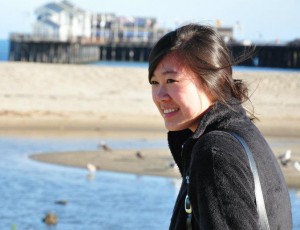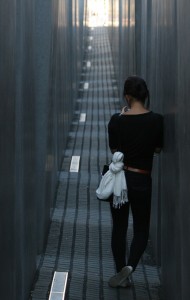The AP-Google Journalism and Technology Scholarship Program fosters new journalism skills in undergraduate and graduate students developing projects at the intersection of journalism and technology. Katie Zhu is one of six inaugural Scholars.

Current location: Evanston, Ill.
Current gig: Part-time Developer at GOOD / full-time student at Northwestern University (Computer Science and Journalism)
Six-word memoir: Learn all the things, add coffee.
Quick and dirty resume: I came into Northwestern as a journalism major and spent my first summer interning at ABC News in Beijing. I picked up computer science my sophomore year, worked at GOOD over the summer and helped build its mobile website. I spent my first two years on campus writing, editing, designing and producing for North by Northwestern. I received a grant to study living labs in Finland and was selected as a Knight-Mozilla News Technology Partnership finalist.
Favorite fictional character: Abed from “Community.”
Why did you choose to get involved with online media?
One of my very good friends taught me how to animate a bike wheel in Flash, and that motivated me to learn to code. I became more interested in the overlap of technology and journalism — not only non-linear narratives but advances in how information gets produced and consumed in the “digital age.” Starting with ActionScript was kind of like going down the rabbit hole, and six months later, I was majoring in CS. My involvement with online media grew naturally out of that change.
What happens during your average day?
I average between three and five espresso shots a day. After that, I let the caffeine work its magic. Typically during the school year, I spend most of my day in class or doing homework. Whenever it’s not midterm or finals season (i.e., the first two weeks of every quarter), I do development work for GOOD and find the time to work on some personal projects. I spend an extraordinary amount of time stalking cute animals on the Internet — Waffles the Corgi is one of my personal favorites. During my free time, I go work in coffee shops in Chicago.
How does one develop a passion for coding, designing and writing? To the naked eye, they could seem unconnected.
I guess I’ve always been more of a creative person — that’s the overarching theme tying my interests together, at least in how I’ve been pursuing them. I started with writing, but I am a very visual person, so I quickly began dabbling in design and (attempting to) make pretty things. And coding — I love building products that can impact people, even if in the smallest way possible. There’s such a natural overlap with UI design, and in crafting a user experience, it’s also similar to constructing narratives. I’ve found that coding, designing and writing actually have quite a lot of underlying similarities, but it’s kind of been a series of fortunate events that I found my way to all three.

You were selected as a finalist in the Knight Mozilla News Technology Partnership. That’s pretty cool, right?
It was awesome. And also a great way to reaffirm my choice of majors, because on paper, the requirements for my journalism and computer science degrees could not be further apart. Some quarters, I feel more like an engineering student, and others, not so much, but it’s pretty polarizing when it comes to classes. The opportunity to participate in an event that marries these two disciplines — and the chance to meet and work with so many great and talented people — was very cool.
You speak English, French, Chinese and Ruby. How important is it for journalists to become bilingual?
As a journalist, I do think it’s important to have additional language skills — it just helps with one’s ability to tell stories and capture different perspectives. And in the context of digital journalism, fluency in programming languages is just as important, because the way we now publish on the web is through code.
How will your project, LedeHub, push journalism forward?
LedeHub pushes the trends of digital journalism forward by fostering collaborative, continuous and open journalism while incorporating elements of crowdsourcing to allow readers, reporters and new organizations to come together in unprecedented ways. Journalism needs to become more open, like the web. Information should be shared. With LedeHub, I hope to foster similar transparency and collaboration. LedeHub is essentially GitHub for articles. The traditional model of reporters as “gatekeepers” of information has slowly eroded with the rise of digital journalism. My project re-imagines the current reporting and writing workflow while underscoring the “living” nature of articles. By representing stories as “repositories” — with the ability to edit, update, commit and revert changes over time — the dynamic nature of news is effectively captured.
We see that you’re a member of ONA — how has ONA membership helped you so far?
I was fortunate enough to serve in the ONA11 (annual conference) Student Newsroom this past fall and got to work with a great group of digital journalists with a diverse skill set — I learned a lot. ONA’s also been a great network and I’ve met a lot of people I admire who motivate me to learn and work harder.
If you had a million dollars dedicated to improving media, you would …
I’d take half the money to hire some web developers and make them teach classes in newsrooms. I’d probably put the rest of the money in a fund to be split among news organizations that collaborated on reporting and shared information to produce stories.
